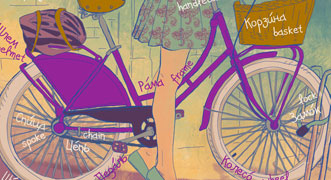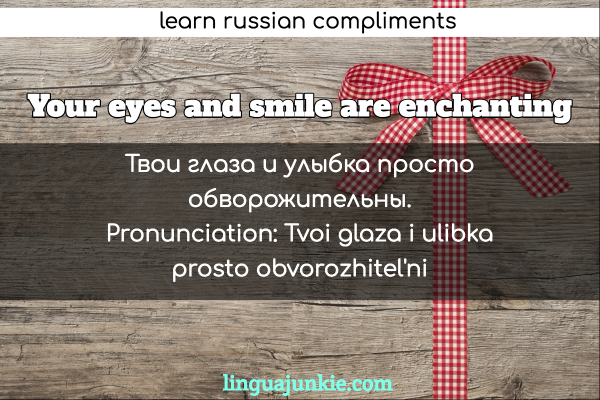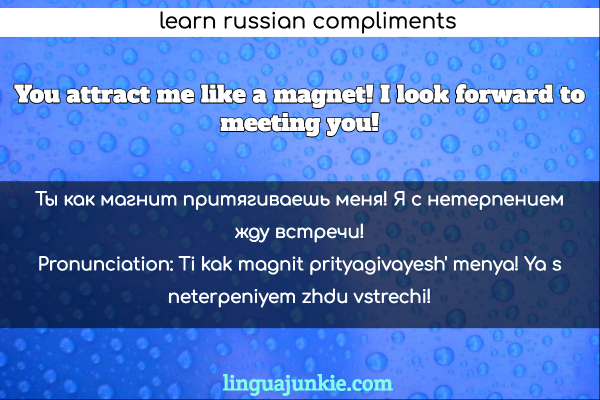Countless slang can be used to describe women in Russian. Source: RIA Novosti
Words referring to women are a touchy subject in any language, and Russian is no exception.
In Russian, the basic words are девочка (pre-pubescent girl), девушка (post-pubescent girl), женщина (woman) and мать (mother).
In slang, almost anyone can be a mother or “old girl” (старуха), as in the song by Boris Grebenshikov: “Come on, mother, jump into my bed!” (А ну-ка, мать, беги ко мне в кровать!).
In the 1960s, slang was primarily replenished from the English lexicon; so it is not surprising that the word “gerla” (герла) became commonly used then. The English “girl” came into the language mainly because it is was repeated many times in the eponymous song of the Beatles—the only one of their songs that was released on Soviet vinyl records (the name of the song “Girl,” or “девушка,” in Russian, was followed by the inscription “Folk music and words, performed by an unknown vocal and instrumental group”).
In parallel with “gerla”, the Russian word “tyolka” (тёлка) became widely used in slang. “Tyolka” is a young cow. This term is not exactly linked to the word “cow” (корова) – which is usually a derogatory term for a fat woman – but rather with the word “tyelo” (тело), which means “body.” The contemporary author Sergei Minayev recently chose a title for one of his most popular novels by combining the Russian slang word with the English definite article: “The Tyolki” (The Тёлки).
Still, it is insulting to call a girl a “tyolka” right into her face. But other animal metaphors are usually used as compliments—for example, “bunny” (зайка) or “pussycat” (киска). However, where women are concerned, comparisons with dogs should be avoided. The word “suka” (сука) used to refer to female dogs, is very rude, almost obscene and more of a curse – like its English translation. This can be illustrated by an anecdote about female logic:
Husband to wife: “Honey, keep your voice down.”
Wife: “Am I too loud? Do you mean I am shouting? So you’re saying that I’m barking? Mother, he just called me a bitch!”
Another absolutely obscene word comes from the ancient Russian word “blud” (блуд), which was used to refer to lechery. In slang, “blud” means a woman of easy virtue. A no less offensive equivalent is the word “shlyukha” (шлюха), which means whore. However, during the years of perestroika in the late 1980s, the scornful attitude toward prostitutes suddenly changed to sympathy and even envy. The fact is that these girls, who catered to foreign tourists in expensive hotels, earned in one night the amount equivalent to the monthly salaries of their parents.
Paradoxically, the trade of the “foreign currency hooker” (валютной проститутки) became romanticized in the public consciousness. A detailed report about their hard life, “Nocturnal Butterflies,” appeared in the popular newspaper Moskovsky Komsomolets. There was also the tragic melodrama “Intergirl,” which made a triumphal appearance on the silver screen. These “intergirls” were called by a beautiful Italian name—“putana” (путана). In those years, the following anecdote became rather popular:
“You finished school with honors, you graduated from university with honors, too, and you started graduate school. Why are you now a putana?”
“I must have been lucky.”
Prostitution is not an official trade in modern Russia, but the black market of sexual services is extensively developed. Since it is prohibited to openly advertise these services, they use euphemisms that are clear to everyone: For example, “leisure” (Досуг) or “escort”(Эскорт) is just a legal substitution for the phrase “sexual service” (Интим). When the editor-in-chief of Moskovsky Komsomolets was criticized for the fact that he published hundreds of promotional offers featuring the word “leisure,” he replied that he could not refuse the advertisers.
In slang, the verbs “to pick up” (снимать) or “to glue” (клеить) are used when a guy tries to meet a girl. Another present-day joke focuses on the ambiguity of modern slang, combined with the realities of life, which have radically changed in recent decades:
What does the sentence “The boy glued a model in the club” mean?
30 years ago, it meant, “The boy made a model of an airplane in an after-school program.”
Today it means, “The boy picked up a hot girl at a nightclub.”
All rights reserved by Rossiyskaya Gazeta.
Get the week’s best stories straight to your inbox

This article will talk about 4 way to greet russian women. Other articles regarding culture that are worth reading: History of Russian Ballet, Bread in Russian Culture, Traditions in Celebrating Victory Day, and Culture of Valentine’s Day in Russia.
In the time of the Russian Empire, for centuries the Russians used to address each other as “сударь” (master) and “сударыня” (mistress). Generally in Russia, there is a greeting which is similar to that of “господин” (master) and “госпожа” (lady or mistress). The revolution of 1917 also had an impact on the use of greetings in everyday life. The word “товарищ” (comrade, comrade) has become more popular, although previously it is also well known among Russian society, for example in Aleksandr Pushkin’s poem entitled “К Чаадаеву” (To Chaadayev). The greeting “товарищ” is not only used for men, but also for women, as a symbol of gender equality in Russian society. The word “товарищ” also has a more intimate meaning so that the called feel closer to the relationship because it has the meaning of “comrade arms”. Therefore, to give a more formal impression or to the writing of documents, in Soviet times used the word “гражданин” for men and “гражданка” for women, meaning ‘citizens’.
Here are 4 ways to greet Russian women, such as:
1. First greet with извините – izvinite – excuse me
This greeting shows that you respect the Russian people. For the “-te” suffix in this word izvinite has an important meaning. This shows that you have chosen a respectful compound greeting form. Due to the Greeting of one person using a compound or a single form has its own meaning.
In Russian, the compound form Вы (Vy, you) is a polite and obligatory greeting when greeting a woman older than you. However, the greeting ты (ty, you imply a closer relationship with the other person) is usually used with the other person’s permission, but this greeting does not apply in lower-class society, because it dislikes the preference of modesty and the usual use of мужик (muzhik), братан (bratan), or земеля (zemelya) as a form of greeting between women.
2. Say greetings
Say greeting is a word to appreciate others especially women. In Russia also has culture of saying hello, especially for those who are familiar. In Russian, the most commonly used greeting is Здорово! [zdo-ro-va] – Hello / hi. In addition, there are also greetings in the time function, such as:
- Доброе утро! [dobroye utra] – Good morning
- Добрый день! [dobriy dyen’] – Good day
- Добрый вечер! [dobriy vyecher] – Good afternoon / good night
In russian as well as English, a good night’s sleep is two words, such as:
- Доброй ночи! [dobroy nochi] – Good night / good night
- Спокойной ночи! [spakoynoy nochi] – Good sleep
3. Simply by calling first name only
Such conditions are very reasonable in many countries, including in our country Indonesia. In russia there is also a similar habit that is with the name of just the name. When you are familiar, can by calling with a “familiar call” or in Russian terms called ‘short name’ (сокращенное имя).
The majority of Russian people have familiar names such as:
- Алексей> Алёша
- Надежда> Надя
- Павел> Паша
- Мария> Маша
- Максим> Миша
- Екатерина> Катя.
If the russian has a close relationship with you then can always use the word call directly “ты” (you). There are several familiar calls for Russian names there are the same and are used for both male and female names, for example:
- Александр and Александра> Саша
- Евгений and Евгения> Женя
Basically the familiar name of the russian there is a derivative known as a small name (уменьшительно-ласкательное имя). For example:
- Мария> Маша> Машенька
- Екатерина> Катя> Катюша
- Дарья> Даша> Дашенька
- Михаил> Миша> Мишка
- Александр> Саша> Сашенька.
4. End with say greeting
The majority of women would love a polite person, one way to greet women in Russia is to end with a farewell greeting. Here are some farewell greetings in Russian, such as:
- До свидания! [da svidaniya] – Goodbye/goodbye
“До свидания” is a formal parting form. You can use it for someone or a group of people you call “вы“.
- Пока! [paka] – See you! / bye!
“Пока” is more informal. This utterance is used in spoken language with someone you can say to “ты“.
As with introductory greetings, there is also a function of time. Here are some time-based farewells in Russian, such as:
- До завтра! [da zavtra] – See you tomorrow!
- До послезавтра! [da poslyezavtra] – Until the day after tomorrow!
- До вечера! [da vechera] – See you tonight!
Related Article:
- most likeable things for russian people
- Characteristics of Russian parents
Although russia classified as European race, but their culture is not much different as in Indonesia. A sense of help and respect for their fellow human beings also becomes their habit. Such are the four ways to greet the Russian woman described above. This article is able to give you a general overview of the culture in Russia.

Some say it’s good to make mistakes while learning a foreign language, because that’s the way to remember words better. Although that’s true, there are common mistakes that nearly all Russian language learners make, so let’s take a look at a list of them. To learn Russian online and avoid making these mistakes, work with a tutor.
Devushka, Devochka, Dedushka… Who Is Who?
These three words may look and even sound the same to a foreigner. The word “девушка” (devushka) means “a girl.” Unfortunately, it’s very close to the word “девочка” (devochka), which is used to address and name a little girl.
Please also remember, if you talk to a waitress at a restaurant or to a saleswoman, you should say “devushka” and not mix it up with the word “дедушка” (dedushka), meaning “an old man”!
Excuse Me, Zhenschina!
Let’s figure out how to talk with Russian women. Again, use the word “devushka” even if you’re talking to a middle-aged woman. The Russian word for “woman” is “женщина” (zhenschina), but never, ever use this word unless you’re talking to a seventy-year-old granny. It’s considered to be very rude, although nobody knows why.
Intonation Matters
Unlike English, the word order in Russian sentences is not fixed. This means it’s easy to make a question out of a statement; all you need is the right intonation. But be sure your intonation is actually right! Otherwise, to the question “Это Красная площадь’?” (Eto Krasnaya Ploschad’?) (“Is that the Red Square?”), you’ll get the answer “Я знаю” (Ya znaiu) (“I know”).
The Russian Letter “ы”
The most popular advice to pronounce this letter is to imagine that someone has slightly punched you in the stomach. Take your time while practicing it. Please don’t be lazy and say “i” instead, as this can lead to some misunderstandings.
There are words such as “мишка” (mishka), which is a small bear, versus “мышка” (myshka), which is a mouse, and “бить” (bit’), which means “to beat,” versus “быть” (byt’), which means “to be.” The only way to make these words sound different is to pronounce “ы” correctly.
The Tricky Letter “o”
The Russian letter “o” is pronounced like “a” when it’s unstressed. In words like “молоко” (moloko) and “хорошо” (khorosho), the stress falls on the final letter “o.” That’s why you need to say malakò and kharashò. “Молоко” is translated as “milk” in English, whereas “хорошо” means “good.”
Word Stress
If you put stress on the wrong vowel, people won’t understand you. Actually, stress may fall on almost any syllable, and there are very few rules to help. Some words are completely the same aside from word stress.
For instance, there is plàchu (to cry) versus plachù (to pay), zàmok (a castle) versus zamòk (a lock), etc.
When It’s Appropriate to Say “Privet”
Remember that you can use the word “привет” (privet) as a greeting only with close friends. Don’t use it when you meet a person for the first time, especially if that person is much older than you. You can use “здравствуйте” (zdravstvuite) instead.
As you can see, to avoid the most common mistakes, you need a lot of practice. Learn how to pronounce Russian words with a teacher.
I am pretty sure that most Russians over 30 are familiar with the opening lines of Gianni Rodari’s poem Чем пахнут ремёсла (What jobs smell like):
У каждого дела
Запах особый
(Each trade
Has its special smell)
This short poem mentions quite a few jobs, all using masculine nouns – маляр (painter), стекольщик (windows installer), шофёр (driver), рабочий (laborer), кондитер (baker), доктор (doctor), крестьянин (farmer), and рыбак (fisherman). Even лодырь (idler) is a masculine word. This simply won’t do it nowadays.
First of all, the word ремесло (a trade) is not used much and instead is replaced with профессия (profession):
Профессия шофёра-дальнобойщика считается одной из самый опасных. (A long-haul trucker job is considered to be one of the most dangerous.)
When it comes to jobs, there’s really no rule, as far as I know, for when to use a feminine form and when to stick with the masculine. Instead, we seem to follow some неписаные правила (unwritten rules) of linguistic and cultural etiquette. So you know what to expect now – confusion.
First, there are jobs for which separate words exist for a male worker and a female worker:
Рабочий (male laborer or worker) and работница or рабочая (female laborer or worker)
Артист балета (male ballet dancer) and балерина (female ballet dancer)
Учитель (male teacher) and учительница (female teacher)
Портной (female tailor) and портниха (female tailor)
Медбрат (male nurse) and медсестра (female nurse)
Лётчик (male pilot) and лётчица (female pilot)
Then there are jobs that do not have a feminine version or, if they do, it is usually restricted to разговорная речь (colloquial speech). These are the jobs that historically were closed to women, i.e. various trades and many professional jobs. Even when a feminine version exists, it’s the masculine form that is used in job ads and on resumes.
Шофёр – driver
Пекарь – baker
Столяр – joiner
Плотник – carpenter
Слесарь – mechanic
Дворник – street cleaner
Врач and доктор – medical doctor, although there is a conversional feminine version врачиха and докторша. Also, words for medical specialties, such as хирург (surgeon), невропатолог (neurologist), гинеколог (gynecologist), педиатр (pediatrician) – are always masculine.
Диктор – network announcer, although дикторша (female announcer) is a common conversational word.
Бухгалтер – accountant. The feminine бухгалтерша is often used in conversations.
Инженер – engineer
Фотограф – photographer
Педагог – educator
Посол – ambassador
Technically, you can form a feminine version from almost any masculine one. However, there are two problems here.
The first one is that many such attempts will sound not only strange, but carry пренебрежительный (contemptuous) connotation as in менеджерша (female manager).
The second problem is that forming a feminine version might, in some cases, be confusing. For example, words such as докторша or инженерша traditionally mean a wife of a doctor (former) or of an engineer (latter).
In general, when in doubt, use masculine form to describe a woman’s occupation:
Наталья – специалист по веб-дизайну (Natalia is a web-design specialist)
Екатерина Васильевна – прекрасный педагог (Ekaterina Vasilyevna is a wonderful educator)
Мне участковый врач выписала больничный (The neighborhood doctor wrote me a sick-leave note) – notice that here we know that the doctor is a female because of the endings of the past-tense verb выписала (wrote).
У Лидии двадцатилетний стаж работы бухгалтером на крупном предприятии (Lidia has twenty years of experience as an accountant at a large enterprise)
Моя жена волнуется, что её сократят, но она же незаменимый и высококвалифицированный работник (My wife is worried she might get laid off, but she is an irreplaceable and highly qualified worker)
Пойми, Маша, если не будешь учиться, то вырастешь и станешь дворником (Masha, do understand that if you don’t study now, you will become a street cleaner when you grow up).
Your turn now – tell us what it is you do and, for our male readers, what does your girlfriend, wife, mother, sister or female friend does for a living.
Пример: Моя мама до пенсии работала врачом (Example: My mother was a doctor before she retired).
Hi there!
In Russia, there is a proverb: “Девушки любят ушами.” It means “a woman falls in love through her ears.”
There’s another proverb too: “До́брое сло́во и ко́шке прия́тно.” It means “even a cat appreciates nice words.”
Unfortunately, you won’t learn compliments for cats. But, you will learn 30+ Russian compliments for women and men. If you want cats, just leave a comment.
Let’s start!
Audio Lesson to Help You Learn Russian
Want to learn Russian? Here’s an audio lesson (unrelated to love but useful for ALL beginners) that will get you speaking the language.
Just press the play button on the player below.
- Lesson #2 – Greetings – by RussianPod101.com
This lesson came from RussianPod101, a Russian language learning program and website.
Click here to visit RussianPod101 for more fun & easy lessons.
1. You are beautiful in Russian
- Вы прекрасны!
- Pronunciation: Vi prekrasni
This is the simplest and most common Russian compliment for women. These two words are easy to remember. “Вы прекрасны!” means You are beautiful in Russian.
It can also pass for “You are wonderful.”
There’s one more, simpler variation of this compliment.
2. You’re pretty/beautiful
- Tы красивая
- Pronunciation: Ti krasivaya
This is another common way of saying You Are Beautiful in Russian. Again, just two words. But, this is more on the casual side because of the word you (Tы).
In this article, you’ll see two ways of saying you. Ты (Ti) and Вы (Vi). What’s the difference? Вы is the plural form of you but is also used as a polite way of saying you. Ты is a more casual, friendly way. Which you choose is up to you.
These are probably the only 2 Russian compliments you need to know.
But, if you want to sound a little smarter in Russian, keep reading.
3. You look good.
- Ты хорошо выглядишь
- Pronunciation: Ti horosho viglyadish
This is a very simple Russian compliment. You can use this on anyone, man or woman. The phrase contains no gender references.
4. Your eyes and smile are enchanting
- Твои глаза и улыбка просто обворожительны
- Pronunciation: Tvoi glaza i ulibka prosto obvorozhitel’ni
“How to Compliment a Girl on Her Eyes” and “How to Compliment a Girl on Her Smile” are the most common typical searches in Google search.
I’m not surprised. You should not be either.
Eyes and smile are great features to compliment. “Твои глаза и улыбка просто обворожительны” means “Your eyes and smile are enchanting.” The word “обворожительны” is rarely used in everyday speech, which makes this phrase romantic and beautiful.
5. In your eyes is a piece of the sky.
- В твоих глазах кусочек неба.
- Pronunciation: V tvoyih glazah kusochek neba
Just look at that, eyes and sky in one sentence.
If that’s not a recipe for a great compliment, then I don’t know what is.
6. You are the most charming and attractive girl.
- Ты самая обаятельная и привлекательная девушка.
- Pronunciation: Ti samaya obayatel’naya i privlekatel’naya devushka
A wonderful compliment to a young girl!
It might sound odd to call a girl charming in English but it works in Russian.
7. You attract me like a magnet! I look forward to meeting you!
- Ты как магнит притягиваешь меня! Я с нетерпением жду встречи!
- Pronunciation: Ti kak magnit prityagivayesh’ menya! Ya s neterpeniyem zhdu vstrechi!
You can use this on a girl you have not seen for a bit, for example, for a few hours, and are dying to see.
This is a great Russian compliment to send as a text message.
8. I have no words to express admiration! You disarmed me!
- У меня нет слов, чтобы выразить восхищение! Ты меня обезоружила!
- Pronunciation: U menya net slov, chtobi Virazit’ voskhishcheniye! Ti menya obezoruzhila!
Want to show a a woman that she rules your heart? Show your delight with this compliment. Let’s break it down.
9. I have a feeling that kindness is concentrated in your sweet hands: from your touch, I feel warm and cozy.
- У меня ощущение, что в твоих милых руках сосредоточена доброта: от твоих прикосновений мне становится тепло и уютно.
- Pronunciation: U menya oshchushcheniye, chto v tvoih milih rukah sosredotochena dobrota: ot tvoih prikosnoveniy mne stanovitsya teplo i uyutno.
This is an incredible Russian compliment. There is no girl who can resist this phrase if you say it.
As psychologists say, the hands are associated with the motherhood, bonding and trust, so the woman will feel your trust.
It’s pretty long-to-say too.
10. Oh, my God, what a woman! A real dream of a man!
- О, Боже, какая женщина! Настоящая мечта мужчины!
- Pronunciation: O, Bozhe, kakaya zhenshchina! Nastoyashchaya mechta muzhchiny!
Excellent words that will conquer a confident woman!
By the way, the first phrase “О, Боже, какая женщина” is good to know in general. Like, if a beautiful woman passes by and you’re instantly head over heeds.
You can say this to yourself, or whoever you’re with.
As a bonus, “О, Боже” or “O bozhe” means Oh My God in Russian.
11. You made a fire in my soul, and love began to reign in the heart!
- Ты зародила в моей душе огонь, а в сердце начала царствовать любовь!
- Pronunciation: Ty zarodyla v moey dushe ohonʹ, a v serdtse nachala tsarstvovatʹ lyubovʹ!
This phrase is quite intense and should be spoken very sincerely.
So, don’t use it unless you’re sure you’re going to be with them.
Otherwise, you will scare the poor girl away.
12. Even the sky admires your radiant smile!
- Ваша сияющая улыбка восхищается даже небом!
- Pronunciation: Vasha siyayushchaya ulibka voshishchayetsya dazhe nebom!
And again, we compliment the smile.
Here are 3 bonus Russian compliments to use for girls you’ve just met.
13. You make me smile.
- Ты заставляешь меня улыбаться.
- Pronunciation: Ty zastavlyayesh’ menya ulybat’sya.
This compliment exists in all languages. There is no need for explanation. “You make me smile” are great words to any woman.
Literally, it means “you force me to smile.”
14. I have something with my eyes – I can not tear them away from you.
- У меня что-то с глазами – я не могу оторвать их от Вас.
- Pronunciation: U menya chto-to s glazami – ya ne mogu otorvat’ ih ot Vas.
A great compliment, which means, that the girl or woman is beautiful.
15. You are so beautiful that I forgot what I wanted to tell you.
- Ты так красива, что я забыл что хотел сказать тебе.
- Pronunciation: Ti tak krasiva, chto ya zabil chto hotel skazat’ tebe.
This is great phrase when meeting with a girl.
Or, you can try and stop one, try to say something but “end up” using this phrase.
These are the best Russian compliments you can say to a beautiful girl or woman.
Russian Compliments for Men
For a man, a compliment is like an energy drink.
Compliments increase self-confidence and self-esteem. Therefore, it is important to give a man this kind of emotional support.
You will be surprised, even “harsh Russian men” like compliments! Let’s start.
16. I adore you.
- Я тебя обожаю.
- Pronunciation: Ya tebya obozhayu
17. What beautiful eyes you have.
- Какие красивые у тебя глаза.
- Pronunciation: Kakiye krasivyie u tebya glaza
Eyes are an excellent point to compliment. Men like these kind of words.
18. You are a real man!
- Ты настоящий мужчина!
- Pronunciation: Ti nastoyashiy muzhchina
This is perhaps the best compliment you can say to any man.
19. You are very reliable – I feel good with you.
- Ты очень надежный — мне хорошо с тобой.
- Pronunciation: Ty ochen nadezhniy — mne horosho s toboy
Men like when a woman considers them reliable.
20. I love your sense of humor! I have a lot of fun with you!
- Я обожаю твое чувство юмора! Мне очень весело с тобой!
- Pronunciation: Ya obozhayu tvoye chuvstvo yumora! Mne ochen veselo s toboy
A sense of humor is one of the most important traits of character.
Any man will appreciate these words.
21. I have no words to express admiration! You disarmed me!
- У меня нет слов, чтобы выразить восхищение! Ты меня обезоружил!
- Pronunciation: U menya net slov, chtoby vyrazit’ voskhishcheniye! Ty menya obezoruzhil!
A great way to show a man that he rules your heart.
22. Your charm can not be resisted.
- Твоему обаянию невозможно противостоять.
- Pronunciation: Tvoyemu obayaniyu nevozmozhno protivostoyat’
You need a special case to say such an intense Russian compliment.
For example, when a man compliments you, you can reply with this.
23. Oh, my God, what a man! A real dream of a woman!
- О, Боже, какой мужчина! Настоящая мечта девушки!
- Pronunciation: O, Bozhe, kakoi muzchina! Nastoyashchaya mechta devushki
Excellent words that will conquer a confident man.
24. You’re the coolest lover in the world.
- Ты самый классный любовник в мире.
- Pronunciation: Ty samiy klassniy lyubovnik v mire.
This compliment can be addressed only to a person you really love it can be your husband or your boyfriend.
You can’t say “Ты самый классный любовник в мире” to a person you just met.
“Классный” means cool.
25. You have a great kind heart
- У тебя большое доброе сердце
- Pronunciation: U tebya bolshoye dobroye serdtse
26. You make me smile.
- Ты заставляешь меня улыбаться.
- Pronunciation: Ty zastavlyayesh’ menya ulybat’sya.
“You make me smile” is a great compliment for any person.
27. A real gentleman!
- Настоящий джентльмен!
- Pronunciation: Nastoyashchiy dzhentlmen
28. Next to you, I feel like a real Lady or even Queen.
- Рядом с тобой я ощущаю себя настоящей Леди или даже Королевой.
- Pronunciation: Ryadom s toboy ya oshchushchayu sebya nastoyashey Ledi ili dazhe Korolevoy.
This is best said by a woman.
29. I value your opinion and appreciate it, because you always find the right solution to any situation.
- Я дорожу твоим мнением и ценю его, так как ты всегда находишь правильное решение из любой ситуации.
- Pronunciation: Ya dorozhu tvoim mneniem i tsenyu yevo, tak kak ti vsegda nahodish pravilnoye resheniye iz lyuboy situatsii
This compliment can be to anyone, including a colleague, family member or a friend.
30. You make me laugh, even when I’m sad.
- Тебе удается заставить меня смеяться, даже тогда, когда мне грустно.
- Pronunciation: Tebe udayetsya zastavit menya smeyatsya, dazhe togda, kogda mne grustno
This is another compliment that emphasizes their sense of humor.
Now you know 30 Russian compliments. Some are simple. Some are complex. You choose which one you want to say.
Good luck!
– written by the Main Junkie
P.S. I highly recommend this for Russian learners. If you REALLY want to learn Russian with 1,000s of fun, easy audio/video lessons by real teachers – Sign up for free at RussianPod101 (click here) and start learning!











